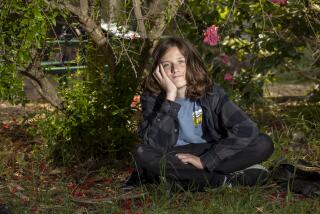DONELLA MEADOWS : Heart’s Path Set on Earth Problems
- Share via
Donella Meadows describes herself as a “systems person.”
“That’s not easy in a world where people want you to be a specialist in something,” she says. “I have to explain that I have no higher goal than the preservation of nature, but you can’t preserve nature and not get involved in poverty and toxic waste and economics and technology and everything else.”
Those are the issues that occupy Meadows, 49. A specialist in computer modeling, (mathematical reconstruction of any environmental phenomenon, such as climate) she shares a New Hampshire communal farm (“We farm organically and heat the house with wood, which we harvest renewably,”) and works with an informal network, the Balaton Group, whose members are studying major environmental problems in 21 countries .
The structure for this lifestyle was laid in 1969 when, after completing her Ph.D. in biophysics at Harvard, she took a year’s break and traveled in India.
“I was an American kid who had thought science and technology could save us from anything. But there we were in the middle of poverty and erosion and disappearing jungles and burgeoning cities.”
She particularly remembers a visit to the Periyar nature preserve in the south of India. “There were beautiful egrets flying around elephants, there was jungle and highlands and wet rain forests. Then there was a dinky little fence that separated it from the barren villages and erosion and starvation. It seemed almost immoral to have a nature preserve in that poverty.”
The visit to India was pivotal.
“Both my mind’s path and my heart’s path were set. . . . I knew those were the problems I wanted to work on.”
Back in the United States, she and then-husband Dennis Meadows worked on an MIT project to make a computer model of the world and the interactions of all the ecological and economic problems they had just seen in India. From that work came their book, “The Limits to Growth.” Its message--that economic and population growth are problems that have to be stopped--stirred up considerable controversy, partly, says Meadows, because the real point was missed.
“We said that with controlled growth, a sustainable world is possible,” she explains.
Five years ago, systems analyst/college professor/futurist Meadows also became a journalist, self-syndicating a column on the global environment, based on her conviction that problems can’t be solved until people understand them.
Her writing, like her conversational style, is unencumbered and direct. For instance:
“The Environmental Protection Agency is charged with being sure that the public comes to no harm from the use of 600 active pesticide ingredients and 1,200 ‘inert’ ones sprayed on 376 agricultural commodities by 2 million farmers. That charge has always been and still is impossible. . . . “
As Earth Day II approaches, Meadows’ assessment of the state of the Earth is mixed: “I’m not as hopeless as I used to be, and I’m not sure why. But some good things have happened.”
For instance, “although population is still the No. 1 problem, the way the world thinks about it has been completely transformed where it counts, which is in the Third World. Twenty years ago you couldn’t even talk about the subject in the United Nations: today the governments are deeply concerned and asking for help: the political will has changed on that one.
“Also, the Montreal agreement on ozone, which was an actual international agreement to shut down a manufacturing program (of ozone-destroying chlorofluorocarbons) is a first. It shows the ability of nations to work together and it shows that people are taking it seriously.”
On the other hand, the two urgencies that worry her the most are the loss of ecosystems (the rain forests being the most common example) around the world, and global warming. “That’s scary because it’s the change of a whole system,” she says.
“It’s difficult to put this all together and say either we are doomed or we are out of the woods.”
NOTABLE
Member of MIT team that used computer modeling to study global environment and produced “The Limits to Growth”; author of several technical books on world modeling.
NAME: DONELLA MEADOWS
TITLES: Biophysicist, systems analyst, adjunct professor of environmental studies at Dartmouth College and environmental journalist.
QUOTE: “The really tough things we have to do--like totally rethinking lifestyles, economies, distribution, justice--we haven’t even approached yet.”
Related stories: Personal Stories From the Environmental Front: E2
More to Read
Sign up for Essential California
The most important California stories and recommendations in your inbox every morning.
You may occasionally receive promotional content from the Los Angeles Times.













